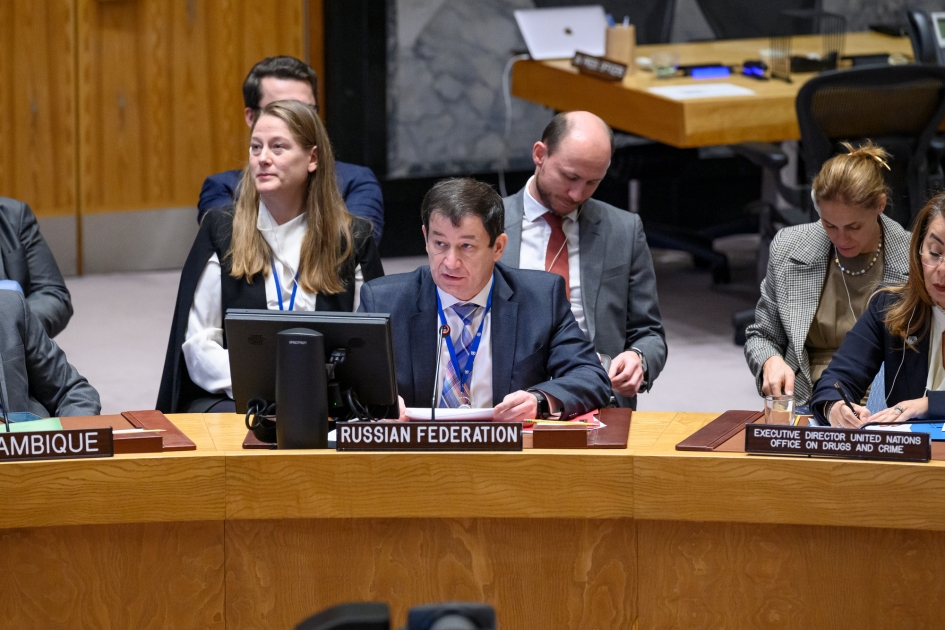Statement by Chargé d'Affaires of the Russian Federation Dmitry Polyanskiy at UNSC open debate “Transnational organized crime, growing challenges, new threats”
Mr.President,
We thank the delegation of Ecuador for convening this debate.
We are also grateful to Secretary-General Guterres for his informative statement on this important issue. We should also like to thank UNODC Executive Director Waly for the meaningful presentation. We also note the statements by Ms. Melani Cammett and Ms.Victoria Nyanjura.
The Russian Federation consistently advocates stepping up international efforts to combat transnational organized crime. The Security Council, given the specifics of its mandate, must view the threat of organized crime through the lens of its linkage to terrorism. In 2019, Security Council adopted resolution 2482 expressing concern that terrorists can benefit from organized crime as a source of financing or logistical support for their activities. The resolution also emphasized the need for coordinated international efforts to meet this challenge.
My delegation is convinced that specialized international cooperation must be implemented in good faith, without hidden agendas and double standards, based on the principles of equality and mutual respect. That approach is the key to the effectiveness of collective efforts to curb those common threats.
When states, including some members of this Council, disregard those principles out of own political interests, it leads to emergence of new hotbeds of tension and expands the geography of the threats of terrorism and organized crime.
Solidarity efforts of the international community aimed at combating the nexus of terrorism and transnational organized crime should be carried out under the central coordinating role of the United Nations and in compliance with international law. We are determined to develop mutually beneficial cooperation in this area within the framework of regional organizations, in particular BRICS, the SCO and the CIS.
Mr.President,
The central role in combating terrorism and transnational crime is played by states. Strengthening states and enhancing their law enforcement capacities is essential for responding to these threats.
We recommend that states make greater use of the capacity and expertise of the UN Office on Counter-Terrorism (OCT) and the UN Office on Drugs and Crime (UNODC) to provide technical assistance to better address the nexus between terrorism and crime at the national level.
We also encourage states to actively engage with the Counter-Terrorism Committee and its Executive Directorate by receiving assessment visits and observing CTC’s recommendations, many of which are directly related to improving the implementation of the provisions on countering terrorism and organized crime.
In combating transnational organized crime, we attach great importance to the activities of the key universal anti-crime structures - the United Nations Commission on Crime Prevention and Criminal Justice and the Conference of the Parties to the United Nations Convention against Transnational Organized Crime. We commend the efforts of the UNODC, which has considerable expertise in strengthening the capacity of states in the anti-crime area.
Mr.President,
The Russian Federation is open to constructive cooperation in resolving global tasks related to the eradication of all manifestations of crime, including its nexus with terrorism. We call on all states to take a serious approach to this problem, first and foremost by ensuring a responsible reaction to relevant requests from foreign law enforcement agencies.
Intergovernmental cooperation in the fight against terrorism and organized crime simply cannot be effective as long as some countries continue to politicize its key aspects. Especially when it comes to mechanisms for mutual legal assistance in criminal matters and extradition.
We note the increased number of politically-motivated denials to grant requests for legal assistance by law enforcement bodies.
Such actions undermine the multilateral and multidimensional nature of countering criminality under the auspices of the United Nations and send a clear signal that certain states would rather pursue their own opportunistic interests, even when this involves playing along with international crime.
Activities of criminals get more aggressive and high-tech by the year, and the forms of transnational organized crime are adapting to changing economic, scientific, technical and geopolitical realities. As opportunities grow, so do criminal profits, which are redirected, among other things, to financially support terrorist networks.
We condemn actions that encourage the illicit trafficking of weapons, including small arms and light weapons (SALW). The blatantly irresponsible approach of some states to these issues leads to a wide range (not limited to light) weapons ending up in the hands of terrorists and criminal groups. A good example is the situation in Haiti, which in many ways aggravated because of the insufficient efforts of regional stakeholders to curb the flow of SALW to Haiti in the context of the country’s arms embargo.
The uncontrolled spread of weapons supplied by the West to Ukraine poses no lesser threat. It is no secret that a significant part of these weapons goes to the black market, ending up in the hands of terrorist and criminal groups. The weapons surface not only in Europe, but also in the Middle East, Africa and even Latin America. We will have an opportunity to discuss this problem in detail at a meeting of the Security Council that we have requested for December 11.
We are convinced that it is crucial for all UN member states to adopt effective legislation and other measures to prevent weapons from falling into the hands of terrorist and other criminal organizations. Since 2021, the OCT has been successfully implementing a Russia-initiated project on countering the supply of terrorists with weapons. In its initial phase, it focused on strengthening the respective capabilities of Central Asian countries. The next phase involves assistance to African states.
Mr.President,
In conclusion, we hope that adoption of a PRST on the threats posed by terrorism and transnational organized crime will help to intensify international cooperation in this area.
Thank you.
